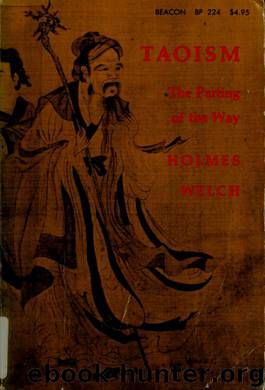Taoism : the parting of the way by Welch Holmes

Author:Welch, Holmes
Language: eng
Format: epub
Tags: Laozi, Taoism, Taoïsme
Publisher: Boston : Beacon Press
Published: 1966-03-05T16:00:00+00:00
you have seen them and made the feng and shan sacrifices, then you will not die." ^
The first step in transmuting cinnabar, as proposed to Wu Ti by Li Shao-chiin, was sacrifice to the Stove. The God of the Stove (Tsao Chiin) was to become one o£ the great divinities of Taoism. Under the title of Director of Destinies (Ssu-ming) he kept a register of men's good and bad deeds and determined the length of their lives through his recommendations to Heaven. By the third century a.d. he had acquired a niche in the house, and even today, as the Kitchen God, he is worshipped in almost all Chinese families, who sacrifice and feast at New Year's on the occasion of his annual trip to report to the Jade Emperor.
Tsao Chiin's entry onto the scene is significant not only because it shows that the early alchemists considered divine favour necessary for success, but also because he is the first clearly identified divinity to be associated with any current of Taoism. For at least a century before, anonymous spirits (shen and ^uei) had figured in the cult of P'eng-lai and magic recipes. But they had no well-defined function, place in Heaven, or mode of worship.
The God of the Stove, as I say, had another title: Director of Destinies, or Ssu-ming. This title originally may have represented a separate divinity and one which had had a long history. At least as early as the eighth century b.c. the Book of Documents^ tells us: "Heaven, looking upon men below, keeps a record of their righteousness and accordingly bestows on them many years or few." There is a bronze from the sixth century b.c. that records offering two jade goblets and eight tripods to Ta Ssu-ming, the Great Director of Destinies. This bronze comes from Ch'i, the land of the shamans and magicians. In the fourth or third century b.c. Ssu-ming was a god with whom the shamans of Ch'u sought mystical dalliance. For them he was already the regulator of the length of human life. He was still being worshipped by the Ch'u shamans a few years before Li Shao-chiin appeared at court. If, as the Li Chi indicates, Ssu-ming had already been identified with the God of the Stove when Li Shao-chiin sacrificed to the latter in 133 b.c, then the God of the Stove is not a new divinity, but only new to Taoism. Ssu-ming is a good example of the difficulties
*Sh{h chi. 28/2lb.
* Shu ching, Kao Tsung jung jih. 3.
Download
This site does not store any files on its server. We only index and link to content provided by other sites. Please contact the content providers to delete copyright contents if any and email us, we'll remove relevant links or contents immediately.
The remains of the day by Kazuo Ishiguro(8970)
Tools of Titans by Timothy Ferriss(8365)
Giovanni's Room by James Baldwin(7326)
The Black Swan by Nassim Nicholas Taleb(7106)
Inner Engineering: A Yogi's Guide to Joy by Sadhguru(6785)
The Way of Zen by Alan W. Watts(6600)
Asking the Right Questions: A Guide to Critical Thinking by M. Neil Browne & Stuart M. Keeley(5758)
The Power of Now: A Guide to Spiritual Enlightenment by Eckhart Tolle(5749)
The Six Wives Of Henry VIII (WOMEN IN HISTORY) by Fraser Antonia(5496)
Astrophysics for People in a Hurry by Neil DeGrasse Tyson(5182)
Housekeeping by Marilynne Robinson(4436)
12 Rules for Life by Jordan B. Peterson(4299)
Double Down (Diary of a Wimpy Kid Book 11) by Jeff Kinney(4261)
Ikigai by Héctor García & Francesc Miralles(4246)
The Ethical Slut by Janet W. Hardy(4242)
Skin in the Game by Nassim Nicholas Taleb(4237)
The Art of Happiness by The Dalai Lama(4125)
Skin in the Game: Hidden Asymmetries in Daily Life by Nassim Nicholas Taleb(3989)
Walking by Henry David Thoreau(3952)
